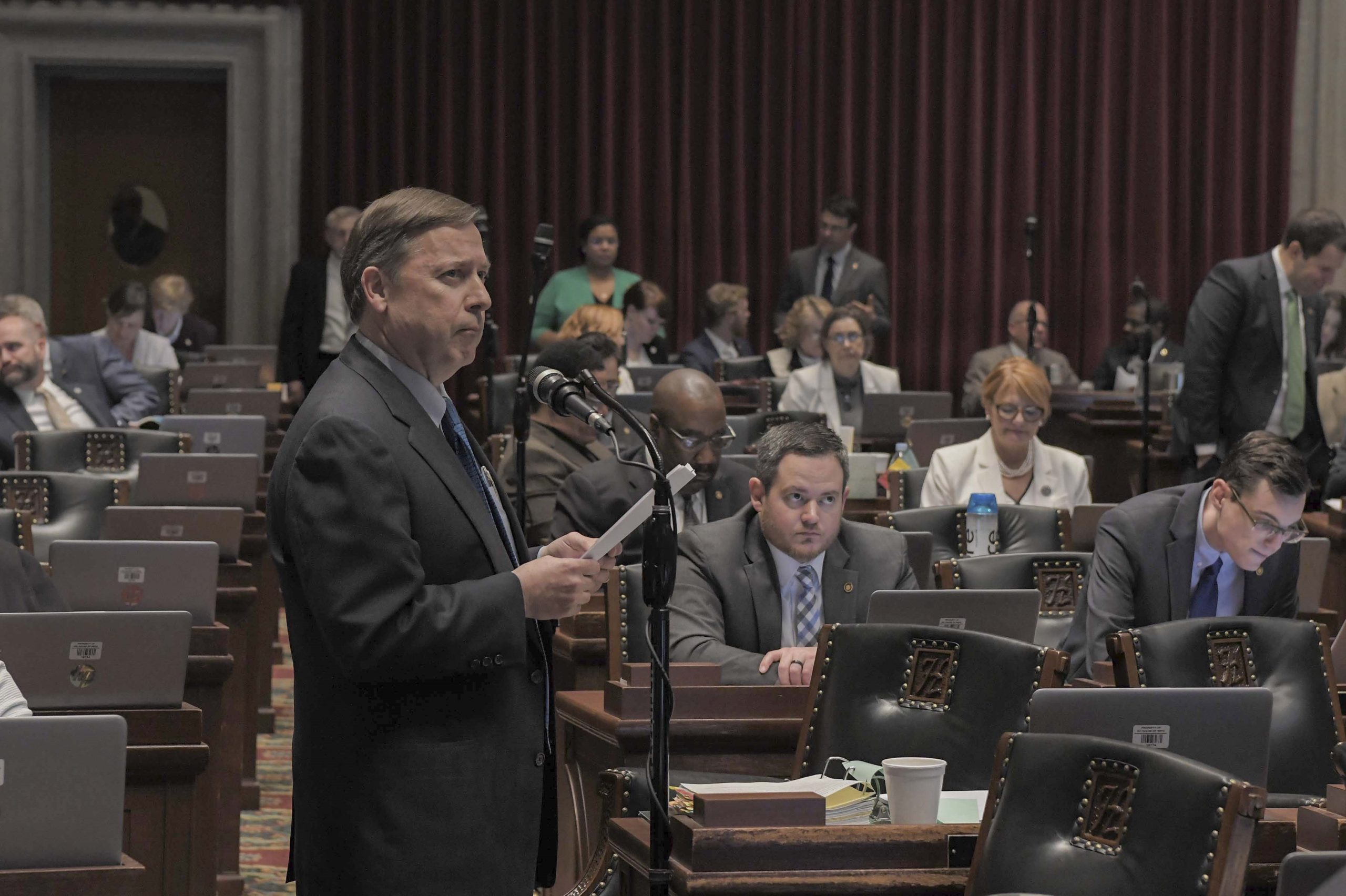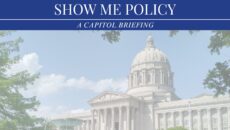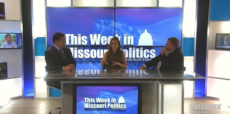As a state representative, I have had a front-row seat for Missouri’s response to the coronavirus threat. We made significant preparations to cope with the influx of patients and said our prayers that social distancing and the shelter in place orders would “flatten the curve” sufficiently to save lives and save us from the worst-case scenario nightmare predictions of millions dead nationwide. It has been greatly encouraging to hear from our governor and public health officials on a daily basis that we have mobilized vast resources, provided millions of dollars for equipment that our health care providers and first responders need to keep them safe while they tend to our sick, cut through red tape to make sure that intended recipients get what they should in record time, made sure that our food supply is safe, and have taken common-sense precautions to keep the “curve” as flat as a molehill when compared to the mountains experienced in other countries. Thankfully, we have seen success to date, as nearly half of our counties have not reported positive cases.
It is also gratifying to see the private and nonprofit sectors do what they always do — help in as many ways as possible as quickly as possible to help those in need, starting with distributing food and assisting businesses with the application process to access government resources without further delay. The U.S. has never shut its economy down before on such a scale on purpose. We are in uncharted waters, and it has been gratifying to see how many Americans have risen to the challenge selflessly, starting with our health care workers and first responders, our schools, and our businesses that are enduring hardships unimaginable six months ago.

On the other hand, I have seen the worst, starting with the morons in neighboring states who stockpiled hand sanitizers to sell at radically marked up prices online, raids on toilet paper based on some manner of wisdom that has so far escaped me, and the most galling of all, panic selling by allegedly intelligent financial wizards who manage to detonate trillions of dollars in market value on a daily basis because their quarterly numbers are not going so well — despite the undisputed knowledge that “this too shall pass.” If this lunacy continues, our retirement accounts will need another 10 years of contributions before we can comfortably leave the workforce. I have also spent more time than I would like knocking down nasty rumors that would only make a bad situation worse and plowing through red tape and Catch-22s that have still managed to survive.
Another troubling development: We have been inundated with breathless, non-stop reporting about the numbers who have contracted the virus and those who have died here and worldwide, dutifully updated faster than the financial news updates stock prices.
On the other side of that equation, context is sorely lacking: Nowhere near equal time has been given to the stories of those who have contracted the virus and lived through it, which is in fact the vast majority of those who have been sickened. We have had celebrities sickened by the virus — Tom Hanks and Boris Johnson come to mind immediately. Both survived and are on the mend. The folks in the mass media have been inexplicably restrained about dispensing hope by sharing the good news that the U.S. has a remarkably low death rate per thousand of confirmed cases — which is even less than advertised since there are probably millions among us who have had the virus, thought it was something else, and came through unharmed. I will not hold my breath that the mass media will change its tactics any time soon.
As a state representative, I also have to think ahead to the lessons to be learned from this pandemic and how to best apply them at both the policy and appropriations levels. These are a few of the items I am contemplating at the moment.
First, how do we — if possible — stop or severely curtail the damage to our people physically and economically as a result of viruses that sweep the globe with alarming regularity? Since China appears to be the world’s leading petri dish for brewing viruses that kill animals as well as humans and reportedly facilitates the jump of viruses from animals to humans through the ingestion of such critters as bats and pangolins available through so-called “wet markets,” do we need to permanently medically screen all travelers from China before we allow them to disembark from planes or ships when we know that this virus has as long as a two-week fuse? We wait in long lines at airports now for the TSA to make sure that all of us are not terrorists. The coronavirus has killed a lot more people than terrorists and shaved trillions off our economy, damage that terrorists can only dream of.
For added context, anyone who believes that China is our “friend” has ignored that it is a totalitarian state that has lied through its collectivist teeth about the origins of this virus and fanned on the opportunity to contain it locally in Wuhan, has “relocated” at least 1 million Uighurs into “re-education” camps to cure them of their religious beliefs, has engaged in industrial espionage (and outright intellectual property theft) on a scale never seen before in human history, has invested trillions in infrastructure to control the economic destiny of Asia, all while instituting a “social credit system” designed to enforce domestic “conformity” of more than 1 billion people using Orwellian facial recognition technology to do so (or else). Khruschev told the West he would “bury” us and took off his shoe and banged it on a table at the U.N. to get our attention; China’s President for Life, i.e., Dictator, Xi, has spared us the histrionics and has instead put our trade deficit money to work to bury us quietly, slowly and surely.
Before the dawn of the 20th century, American policy going back to John Hay’s Open Door Notes nearly 125 years ago was predicated on the notion that Chinese consumers would purchase American products in vast quantities and make us rich as a result. The exact opposite has happened. Missouri alone now imports more than $4 billion in goods from China. That represents 20 percent of all the imports in Missouri. China, in turn, buys $700 million of our goods, for a trade deficit in Missouri alone of more than $3.2 billion. We have seen the folly of chasing after the lowest possible price over the last 30 years: The result has been the hollowing out of our manufacturing sector, which devastated the Midwest. We have plenty of empty buildings to show you in Hannibal that are monuments to short-sighted trade policies that gave away our manufacturing birthright.
Our farmers are also feeling the pain of the unpredictability of Chinese markets. At least 25 percent of Chinese hogs have been killed by the latest outbreak of swine flu — probably twice that, considering that China is not renowned for telling the truth about bad news (see coronavirus bald-faced lies above). Those hogs will take years to replace; meanwhile, the soybeans they consumed as feedstocks will not be headed to China any time soon. We literally cannot afford to wait for them to repopulate their swine herds. Charity begins at home. And so does sustained prosperity.
Second, the damage to our economy due to supply chain interruptions from around the globe — primarily China and Japan, but also including Europe — must be examined. Just-in-time delivery is the cornerstone of lean manufacturing, but global disruptions such as this are yet another reminder that globalization is fine and dandy when it works, but craters national economies when it does not. We reroute commerce across Missouri and the Midwest when we are confronted with floods, but this is something different altogether — global supply chains rely on products that begin their transit oceans away, not from neighboring states. The more we make in America, the less we have to rely on products coming in from overseas. And will someone explain the rationale for outsourcing so much of our prescription drug production to China? What corporate geniuses decided that would be in our best interest as a nation? What happens when that supply chain “breaks,” or China decides to sell prescription meds to others? We should be smart enough to never find out that answer, starting today.
Third: When will we start treating broadband internet as infrastructure, every bit as critical to our daily lives as roads, bridges, and electricity? Millions of Americans have been instructed to work from home as a result of this pandemic, and corporations will be evaluating the effectiveness of that approach to their bottom lines. Many of us anticipate that the expedient will become the norm since remote workers cut down on overhead expenses. Working remotely is fine and good if you have the internet capability to do so, but nearly 1 million Missourians in rural areas do not. The same goes for the expanded access to telemedicine announced at the federal level — great for those who have it, irrelevant for those who do not. Imagine how many fewer cases of the flu we would deal with on an annual basis if patients could be diagnosed and treated from home and not have to share their sickness with the general public in the first place. Millions of American students are being told to log on to their portals for online instruction while their schools are closed, but that is not an option for far too many of Missouri’s rural school students — an estimated 20,000 Missouri high school seniors alone this year have no such access at the most critical moment of the year: just before graduation. Virtual education is there in statute and with us in spirit, but does not happen for students who live outside of town.
Finally, we have seen multiple excesses regarding the most routine of civil rights: a governor who has forbidden planting vegetables in family gardens and a mayor taking license plate numbers at drive-in church services like the FBI at a mob boss funeral are two of the most disturbing examples. If there is a “second round” of this virus in the fall and there is no vaccine available for all of us, we are going to have to make hard choices about how far is too far.
Hopefully sooner rather than later, we will take a hard look at the lessons learned from how we handled our response to the coronavirus at the beginning of the 21st century’s “Roaring Twenties.” My prayer is that we all not only survive this pandemic but also find ways to take the sting out of the next inevitable wave of sickness that will wash over our shores in the coming months and years. Knowledge without application is useless. This is the ultimate teachable moment. We literally cannot afford to ignore it.
EDITOR’S NOTE: For up-to-date information on coronavirus, check with the CDC and DHSS.

Rep. Louis Riggs represents Marion, Shelby, and a portion of Monroe Counties in Northeast Missouri.









